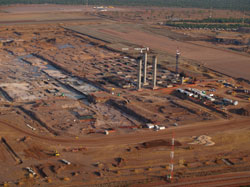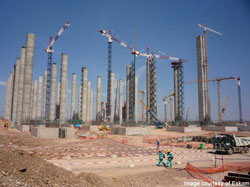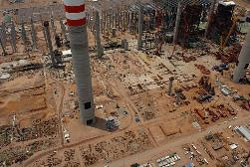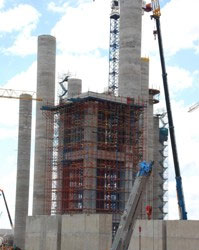Former Eskom employee commenting on a news report that Medupi was going to, yet again, miss its deadlines.
"South Africans need to face the fact that load shedding will be a part of their lives for the foreseeable future" - Business Day editorial 7/3/2014.
I look at the current load-shedding crisis - which is costing the country R100m a day - from a media perspective. My investigation offers some startling insights into what seems to be happening at Medupi and what the impact will be on the country's ability to generate sufficient electricity for its current and future needs...
The beeping of my computer's UPS battery when the lights went off without warning last Thursday morning in Rondebosch, Cape Town, instantly created an unwanted flashback.
At 3pm on Friday, 11 November 2005, the lights went off in the SABC's Sea Point office and our computers crashed. I remember it well because it was my birthday and as the electricity failed, I strolled across to the window and looked at the street below. The traffic lights were off and the mayhem was starting.
The calls started flooding in of chaos throughout the city. For tourists in the Table Mountain cable car there was a moment of terror before the generators kicked in and if you were a person who suffered from claustrophobia and were among the tens of hundreds of people stuck in lifts, your terror was far more prolonged.
Every traffic light across the peninsula failed simultaneously and Cape Town became a gridlocked maelstrom of enraged motorists trying to comprehend what had happened.
If you had what watched what was then e.tv that night, you would have got an excellent visual narrative of the drama. The SABC, however, carried no visuals.
That was the start. It presaged the immensely damaging rolling blackouts of 2008 and the rolling blackouts happening now.
Petrol bomb
An article "Blackouts spell life or death for some - State blamed for failing to implement emergency plan" in the Sunday Times on 9 March starkly sums up 20 years of ANC mismanagement, wasteful expenditure and corruption: "The system has been strangled for years but since the devastating black outs in 2008, which cost the country in the region of R50bn, less than 4000MW has been added to South Africa's stuttering grid."
In an attempt to get a greater understanding of this crisis I started making contact with people working at Medupi last year and this article reflects what I was told. I am not saying that it is all true or accurate and it would be a welcome relief if none of what I was told is true and if everything written here could be refuted. If, however, even half of it is true, then the crisis is far worse than we have been led to believe. I simply proffer the information I have gleaned in the belief that it is of profound public interest and in the hopes that it pulls together, into a coherent whole, threads, which will give us a greater grasp and understanding of the situation, which is now so negatively impacting on every aspect of our lives.
About late October or early November last year, it became known at Medupi that there were severe problems with the top of the Hitachi boiler on unit one that should feed generators 1 and 6.
This affected downstream work of the boiler and the major labour provider on site, Actom Contracting (formerly Alstom), was told that various forms of work could not proceed until the problem was resolved.
This, in particular, affected workers installing electrical components such as cabling and lighting, a R700m contract. After these and other sector workers were informed that they would be laid off for several months, a petrol bomb was allegedly thrown into the Actom offices.
As a result of the following problems/"challenges", I was told, a constant supply of power is unlikely reach the national grid from Medupi before 2018 and that the possibility exists that only one boiler feeding generators 1 and 6 will be operational by that time. (The Medupi project was officially launched on 14 August 2007 at a projected cost of R80bn with the confident prediction that it would be putting electricity into the national grid through six boilers by 2015 at the latest. The current estimated cost is R145bn and it is anyone's guess when it will start generating electricity.)
'Challenges'
Here are some of the "challenges" - to use one of the ANC's favourite and increasingly used euphemisms - which I was told the Medupi project faces.
Lack of institutional knowledge/skills shortage: I was told that, as a result of affirmative action constraints, South Africa has lost its leadership in a number of areas. Mining was specifically cited with the world leaders now being Australia and Canada where many leading companies are now staffed with expat South African managers and technicians.
Construction is another such field where, it is common cause, a huge amount of irreplaceable institutional knowledge has been lost because expert technicians choose to work overseas where they are not denied career promotion opportunities because affirmative action quotas clash with their ethnicity. An example cited was the shortage of skilled welders.
Despite this, as the 2010 Soccer World Cup proved, we can undertake big projects and this raises the next question...
Why Parsons Brinckerhoff? - UK-based Parsons Brinckerhoff was chosen by ESKOM as management consultants rather than local companies such as Murray & Roberts Projects, Aveng Projects and Fluor Daniel, which have extensive local knowledge and despite the controversy that has dogged the company on a number of big projects such as the Silver Spring Transit Centre in Washington DC ... and the Big Dig highway in Boston where the costs rocketed from $2bn to $22bn as a result of "corruption, state administrative collusion and neglect". (Sound familiar?) and California's high speed rail project.
Projected deadlines
Parsons Brinckerhoff is operating in an economic environment where capital projects in the northern hemisphere have stalled because of the economic downturn. It might thus be of benefit to the company if the Medupi project continues going beyond projected deadlines.
Parsons Brinckerhoff has realised, however, that South Africans with local knowledge of the construction industry are needed and they have brought Paul Vester back from the UAE to oversee the project as commercial manager. He thus becomes the 9th person to hold this post since the project started six years ago on 14 August 2007 - a catastrophic turnover of senior management staff.
Water shortage: Is it possible that the main reason why only one boiler and two generators might eventually be built is that there will not be enough water available to supply three boilers and six generators.
Coal shortage: Writing in Business Day on 31/1/2013, Monde Maoto said getting suitable coal at a sustainable price is going to be problematic.
Wescoal CEO André Boje says: "In 2015, there's a supply cliff for Eskom. Where are the 60m tons going to come from? I haven't got the answer. That's a scary number, and you have got to be investing now to have the coal then."
What seems undeniable is that Eskom's insistence that 51% of its coal supplies be sourced from BEE companies is making its coal supplies riskier and more expensive.
Weak foundations? In a comment below an online Business Day article, DA MP Pieter van Dalen makes a startling allegation that has not been refuted by anybody: " ... there is a design fault in the foundations and it is not strong enough to carry the weight of the equipment. The reinforcing is too weak."
Labour 'challenges'
Labour: The full labour force effectively, I was told, only works at Medupi on Wednesday. There is allegedly a very low percentage of workers on site on Mondays and Fridays.
The unions are, it would seem, holding the project to ransom but nothing is done about this.
If Business Day is correct, NUMSA is deliberately sabotaging the Medupi project through violence and the destruction of property.
Load shedding - a media-related chronology: Part 2
Now I look at the some of the critical elements that have prevented the Medupi project from emulating similar projects in the apartheid era such as the Taaibos, Highveld, Komati, Camden, Hendrina, Grootvlei and Kriel power stations, which remained within budget and met construction deadlines. I also assess the contributory role in the current crisis of three men with strong ANC connections and convictions, Alec Erwin, Jacob Maroga and Valli Moosa and the way that the media brought these concerns into the public domain.
Lack of master schedule: The lack of a master schedule has led to on-site chaos which has resulted in Eskom having to buy more and more land to store components. As the project got further and further behind schedule, delivered components started stacking up on site in areas where building needed to commence. These components then had to be transported offsite to newly purchased storage areas which resulted in claims against Eskom and further delays because these components had later to be transported from further afield back to the Medupi site.
Some of these components have been stored in less than optimal conditions which means that rust on pipes and the deterioration of seals will result in such items being condemned before they can be used in construction or them falling outside warranty periods - and yet more expenses to be borne by the South African taxpayer.
Lack of a single contractor: On Chile's Electrica Guacalda coal-fired power station the boiler supplier - Mitsubishi - was made responsible for the entire project but in South Africa the project has been allocated to several contractors which means that, in the end, nobody can be held responsible.
Access to the construction site: Because the swipe card system which grants access to the site is apparently dysfunctional there is no way of knowing which of the plus-minus 16,000 people who should be - but usually aren't - on site each day is authorised to be there. This has particular relevance to...
Meals: The apparent agreement between Eskom and the contractors is that Eskom will provide meals for the workers on site and then retrospectively reclaim this from the contractors. This has allegedly not been done for four years. Eskom allegedly continued to provide these meals even when the workers were on strike and no work was being done. However, because of the failure of the access card system, there is apparently no way of knowing whether the people eating these meals are accredited workers. As the Eskom computer system apparently does not have sufficient calculating capacity and because of inadequate record keeping since the project started, Eskom allegedly has no means of establishing what contractors actually owe for the meals provided so far. I was told however that Eskom will probably use the non-payment of meals as a bargaining tool in the inevitable arbitration and horse-trading which will result as a consequence of the non-delivery or inadequate delivery by some contractors.
Admin staff: A large component of the admin staff lives outside of Ellisras, mainly in Johannesburg, a four hour commute. Because they say they are in cellphone contact while in their cars, they often only arrive on site at midday on Tuesdays and leave at noon on Thursdays, an effective loss on site of three days a week. Mondays and Fridays are spent either working out of Eskom Head Office in Megawatt Park or from a subsidiary office based in Menlyn Centre in Pretoria. I was told that during office hours very little admin work is done at Medupi and staff spend much of their time on Facebook or WhatsApp.
Expats: Because of the recession in Europe, there is very little construction work being done there and a substantial number of consultants - particularly from the UK - is being employed at Medupi and the Kusile plants. Each is given a house, car and other perks and as the cost of living here is substantially lower than in the northern hemisphere, the bulk of their earnings is being banked abroad and lost to the local economy.
Penalty clauses
Will Eskom invoke penalty clauses? This, to paraphrase Winston Churchill "...is a riddle wrapped in a mystery inside an enigma".
Or is it? A canny Sunday Times reader, Mike Edwards of Johannesburg, raised several pertinent points in a letter published on 9 March. Commenting on the Hitachi/Chancellor House scam which saw a R6m investment five years ago result in a R50m payout now - a return which he notes not even Allen Grey could match - he asks a pertinent question given that Hitachi's poor welding on the boilers has set the project back by years and millions of rands: "Does that mean Eskom can now proceed without fear against Hitachi Power Africa, or does the R50m deal have some side agreements whereby the company is not pursued to the hilt or not at all."
Dramatis personae: In addition to the ANC which ignored increasing desperate pleas over years about the looming electricity catastrophe, three key figures need to be noted. The first is former Public Enterprises Minister, Alec Erwin who consistently talked up the Pebble Bed Modular Reactor project which was closed with no return from an R8bn investment.
Erwin, who was unequivocally called liar by the ANC's Ben Turok in an interview with Chris Barron of the Sunday Times on 3 March this year, made his notorious and false claim the day before the March 2006 municipal elections that "sabotage" at the Koeberg power station was the cause of the power outage at the time. Tony Leon sent a press release to SAPA and the SABC in which he said: that ... "there might be an element of sabotage involved but incompetence was clearly to blame." As he was later to point out in his book, "On the Contrary" (Jonathan Ball, 2008): "Yet the only words of mine which the SABC-TV broadcast were: 'There might be an element of sabotage involved.'" (P467).
(I was told, possibly incorrectly, that the French built and maintained Koeberg in return for enriched uranium from the National Party government and that when the ANC ended that program, the French bailed, leaving only a skeleton staff of technicians and consultants, which resulted in continuing maintenance problems and blackouts at the time.)
Thulani Gcabashe was CEO at Eskom from 2002 to 2007 and it was on his watch that colossal pay packets became the order of the day despite often enormous losses. Since Gcabashe took over the annual pay packets have doubled from R4m to R8m in little more than a decade.
James Myburgh of Politicsweb said the roots of the current crisis can be found in two decisions taken by Gcabashe:
"The first of these was to sell off most of Eskom's coal stockpiles.
"The second decision was to not extend the existing coal procurement regime to meet the expected increase in demand over the following 15 years."
But, I was told, there was third contributory factor: He cut back on maintenance to make his bottom line look good and justify the bonuses. As a result, Eskom engineers started to cannibalise the mothballed power stations for spares and when the time came to re-commission them there was a major problem and huge delays. He continued to be remunerated by Eskom after his term as CEO ended.
In February 2006, the DA called for Gcabashe to be dismissed after power cuts hit the Western Cape. DA leader Helen Zille said that Gcabashe's pay package for the 15 months ended in March 2005 amounted to R13m.
"It is time that the bonuses stopped and someone took responsibility for this mess," she said.
The third person responsible in huge measure for our current crisis is former Eskom CEO Jacob Maroga. On 19 July 2007 US consultant Susan Olsen gave Maroga a comprehensive analysis of the crisis ESKOM and the country faced if it did not sort out its coal supply problems.
Maroga's response was to pass it on to his subordinates without comment. They, in turn, effectively dismissed Olsen because her report highlighted their gross incompetence and negligence.
Six months later the electricity shortages she predicted happened.
Carte Blanche exposé
Maroga was obsessed with "transforming" Eskom and to prevent local minority ethnic groups from being employed the parastatal fraudulently recruited black Americans - something which had a devastating impact on their lives, as a subsequent Carte Blanche exposé revealed.
Inevitably, the whistle blowers were victimised.
Maroga, who when he was dismissed bizarrely claimed but did not get an R85m severance package, knows to what our current load shedding can be attributed - it's a conspiracy by whites.
Utterly conflicted
The third person is the ANC's Valli Moosa. In February 2009 a Mail & Guardian exposé of the role played by Moosa in setting up the Chancellor House/Hitachi Power Africa deal was vindicated by the then Public Protector, Laurence Mushwana. A year earlier the newspaper had revealed that Moosa, while chairman of Eskom " ...presided over the parastatal, giving contracts worth billions to ANC funding company Chancellor House - while also serving on the ANC's fundraising committee"
Mushwana found that Moosa was utterly conflicted in so doing.
The cynically corrupt way in the Chancellor House/Hitachi Power Africa deal was set up with the Valli Moosa as the facilitator has been well described by Advocate Paul Hoffman.
The afore-mentioned 9 March letter by Sunday Times reader Mike Edwards succinctly sums up just how dubious this deal was.
"Chancellor House bought 25% of Hitachi Power Africa for R6m in 2009. Did the ANC actually pay the R6m?
"Hitachi Power Africa was formed only in 2009 but was "valued" at R24m even though it had no track record and no projects. It was a serious risk for Chancellor House to put R6m in a new company with no work, or was it? Luckily, Hitachi won two major contracts from Eskom, making the ANC investment safe.
Edwards goes on to write that "In 2010, Hitachi Power Africa advised that Chancellor House stood to be paid up to R50m in dividends over the eight years of Medupi construction. I find it extraordinary that dividends could have been paid during construction when, for at least the first six years, there was no idea whether the project would generate its targeted profit or even achieve one, and no mention of whether the ANC would need to pay 25% of any loss on the project;
"Things are not looking good for the ANC - ah, luckily the ANC comes to an agreement with Hitachi that it will buy back Chancellor House's 25%. But wait, Hitachi Power Africa is now valued at R200m, notwithstanding that the projects are in dire straits with possible huge financial losses and litigation. So Chancellor House pockets R50m against an investment of R6m only five years ago - not even Allan Gray is that good. Amazing, a company whose value goes up from R24m to R200m on the back of project disasters."
Splurged R37m
Party on ... The extraordinary levels of incompetence of the deployed cadres at ANC-controlled parastatals like Eskom was revealed in the Sunday Times article of 9 March, "Blackout spells life or death for some". According to the article, Eskom was offered 6000MW of independently produced power that would have been available to feed into the national energy grid by 2016. It approved only 1400MW, choosing instead to run its four emergency peaking stations on diesel. At the Atlantis peaking station alone, the estimated cost is a staggering R4.7m an hour. But, the one thing that the ANC-controlled parastatals know how to do well is to earn above-average salaries and to party. In 2012 Eskom splurged R37m on entertainment for its staff and their families at a time when the average staff member was being paid R633,000 a year and should therefore have been able to pay for their own parties.
As DA leader Helen Zille noted in a press release after the most recent blackouts, the bonuses awarded by Eskom to its top executives are outrageous given the parastatal's performances.
"Eskom executives awarded themselves R17m in performance bonuses in 2013 and R14m in 2012 - a total of R31m in two years. We believe these bonuses are entirely inappropriate and undeserved. As the last week has demonstrated beyond doubt, Eskom has failed in its basic mandate.
"We have already called on Eskom executives to repay these bonuses, but we also believe that the Public Service Commission should investigate how such bonuses were ever awarded.
"The DA has also launched a public petition to put pressure on Eskom executives to repay the R31m bonuses. In just two days this petition already has 6,794 signatures."
As you struggle with the absence of electricity in your personal and business life, be grateful for a vigilant Fourth Estate which brings these things to public notice and take cognisance of the fact that if the ANC gets its way on the Secrecy Bill, all such matters will, like Nkandla, be covered under the blanket heading of "security" and media companies and reporters will cover them at their peril.
Postscript: In 1998, the ANC was warned that its home electrification program would not be sustainable without more power stations being built. It did not heed the warning. Now outgoing Eskom CEO, Brian Dames, tells us that the maintenance schedule at Koeberg will necessitate more load shedding in the near future. If the prediction is correct that the first electricity from Medupi will only reach the national grid by 2018 it will be 20 long years since the ANC was first alerted to the need for more power stations and, by then, the total loss to the economy might well exceed a thousand billion rands.
(All images, which show Medupi during various stages of construction, courtesy of Eskom)




























































